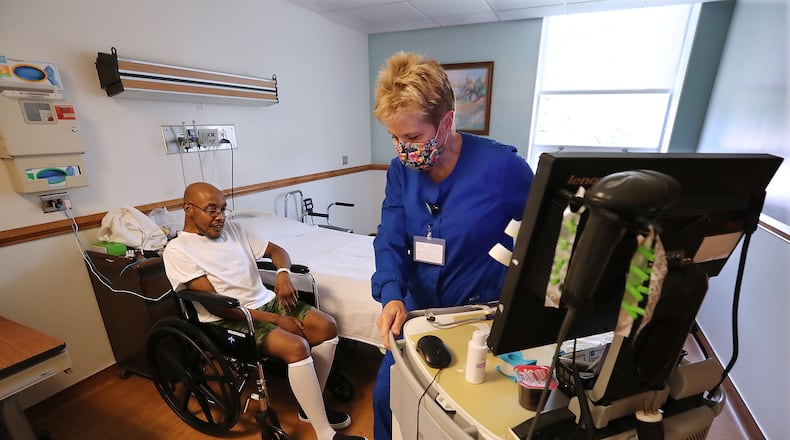After weeks of an eerie silence, some hospitals in Savannah are now jammed with patients.
On a recent day, several ambulances packed the hospital bays outside one hospital’s emergency room, as an unusual number of paramedics waited in the hallway with their patients in cots, ready to drop them off. But there were no beds to receive them, and crews can’t leave until patients are admitted. That can take hours, said Chuck Kearns, chief of Chatham County EMS, the region’s 911 provider.
“One patient was held for seven hours; it’s unheard of,‘' Kearns said.
“Every time you take an ambulance out of service,” he said, “those who aren’t at the hospital are running the wheels off the truck trying to keep up with the rest of the calls.”
Similar scenes are playing out from metro areas to rural counties across the state, as hospitals try to manage a new surge of patients with COVID-19. As many hospitals reach or exceed capacity around the state, concerns are rising about whether they will be able to safely care for all patients.
Credit: Curtis Compton
Credit: Curtis Compton
“It’s very hard,” said Kerry Trapnell, chief executive officer of Elbert Memorial Hospital, a critical access facility northeast of Athens. “It’s scary because we just don’t know if this is the worst or if it’s going to get worse.‘'
Multiple other unknowns are also driving concerns. Will there be adequate resources to handle the new surge, as well as the needs of other patients who have delayed care for months? Already, some regions of the state are down to only a handful of open critical care beds. With cases surging in so many areas and elective surgeries resuming, will there be enough doctors and nurses? Some hospitals say they are struggling to get enough critical care staff.
“Everything is dynamic, and on any given day things could change, and we could see a large swing of (COVID-19) patients,”said Dr. John Wood, medical director of the emergency center at The Medical Center, Navicent Health, which serves central and southern Georgia.
One point of relief: Georgia hospitals are better prepared to handle COVID-19 than they were two months back. After thousands of hospitalizations, clinicians have discovered better treatments and gone to beefed-up infection-control standards to reduce exposure risks. Meanwhile, the new wave of COVID-19 patients tends to be younger and to recover faster with less of a dependence on a ventilator, hospital officials told the AJC.
During the early wave, as many as 40 percent of patients at Phoebe Putney Memorial Hospital in Albany were in the ICU. Now, 15 to 20 percent of COVID-19 patients are in the ICU, said CEO Scott Steiner.
Hospitals also say they have spent weeks stocking up on masks, gowns, gloves and other supplies and to ensure they have an adequate supply. At Augusta University Health, officials are closely monitoring how quickly clinicians are burning through PPE, said Dr. Phillip Coule, chief medical officer at Augusta University Health.
If there are any gaps, Coule said, “We will pull the trigger on some other course of action as soon as we become aware of it.‘'
But questions remain as hospital admissions throughout the state have hit record highs in recent days. Staffing and critical care bed space are looming concerns.
“We’ve got areas all over the state that are experiencing very large numbers of patients; they are bumping up against capacity,” said Anna Adams, vice president of government relations for the Georgia Hospital Association.
“These hospitals are having to reach out to other facilities and try to figure out ways to get patients the treatment they need and not have to travel far from home.”
‘Everybody tense’
Statewide, COVID-19 hospitalizations have surpassed the previous peaks in April. The number of hospitalizations fell through May, and by June 7 the state counted 783 people hospitalized.
On Thursday, the state reported 3,157.
Northeast Georgia Health System reported treating 168 COVID-19 patients on Thursday, beating an April record of 159.
Augusta University Health on Monday exceeded 100 cases of hospitalized patients compared to about a dozen in mid-June. The number edged down to 87 by Thursday.
Bobby McCullough, chief executive officer of Memorial Satilla Health in Waycross, says he’s watched new cases nearly double since the peak in April. This last week, the hospital was treating 29 COVID-19 patients.
Monday, Phoebe Putney in Albany, one of the early hot spots in the pandemic, reported as many as 70 hospitalized patients. The number is much lower than the 176 the hospital treated in April, Steiner said. But back in early June, the health system announced it had no more patients left in its main hospital – a milestone – and 24 in its extension facility, Phoebe North.
The resurgence, Steiner said, is concerning. “Everybody is a little tense,” he said.
Meanwhile, emergency crews that transport patients to hospitals across Georgia are particularly feeling the strain. In metro Atlanta, as well as other spots, large hospital systems are asking ambulance providers to avoid their emergency rooms at times due to their limited capacity in ICUs and for other hospital beds.
EMS officials in Florida recently asked Kearns, the EMS chief in Savannah, to bring a caravan of 25 paramedic ambulances to help with that state’s surge. Kearns had to decline, he said.
“We’ve got our hands full here,‘' Kearns said.
Credit: Curtis Compton
Credit: Curtis Compton
Patients shifted
The search for bed space is fueling some unusual partnerships across the state.
Usually, larger hospitals accept patient transfers from critical access facilities in rural areas, like Trapnell’s Elbert Memorial, which aren’t equipped to handle more complicated cases. Now, those smaller facilities are lifting the burden from their larger neighbors.
When Memorial Satilla Health got busy, Clinch Memorial in nearby Homerville lent a hand. “Knowing they were at maximum capacity and we had empty beds, I called their medical directors and said, ‘Let’s work something out,” said Angela Ammons, CEO of Clinch Memorial.
On Friday, Satilla delivered three patients to Clinch Memorial, confirmed McCullough, the hospital’s CEO.
Kellie Register, chief nursing officer at Clinch, said she expects many more transfers will likely be accepted. “We are staffed to take care of whatever comes in our door,‘' Register said. “We’re here to help.”
As demand for beds fluctuate, hospitals in metro Atlanta are facing a similar dilemma. Wellstar AMC and Wellstar AMC South have been among those that have been asking EMS providers at times to deliver patients to other hospitals because of limited acute care capacity.
However, Kem Mullins, Wellstar’s executive vice president for ambulatory and business development, told the AJC on Wednesday that the hospital system still had a limited number of staffed ICU beds available.
Piedmont hospitals also have asked ambulance providers at times to transport patients who need in-patient beds to other hospitals. But a spokesman said the facilities continued to treat patients on an outpatient basis in the emergency rooms.
Back to Square One
Other healthcare facilities have been reactivating systems and procedures that had been dormant for weeks.
Next week, Phoebe Putney is expected to receive a team of contract workers from Jackson Healthcare, the Atlanta-based provider that partnered with Gov. Brian Kemp early on to bring dozens of critical care nurses, respiratory therapists and others to handle coronavirus patient loads.
The state also is helping staff beds at Piedmont Healthcare to expand the state’s bed capacity as COVID-19 cases soar.
The Georgia Emergency Management Agency told the AJC it would have ready by the end of the day on Thursday rooms at the World Congress Center that will serve as a makeshift hospital for 120 COVID-19 patients. “Once we receive guidance to bring the medical staff on board,” officials wrote, “it will take three to four days to get the staff in place and be ready to receive patients.”
The facility had previously served as a temporary hospital in April then was closed down a month later, as cases dropped.
GEMA also has put an 80-bed facility in Milledgeville.
Days ago, Northeast Georgia Health System in Gainesville reactivated its Incident Command Center, which enables departments across the hospital system to collaborate with one another and permits staff to coordinate care with other healthcare facilities, said Dr. John Delzell Jr., the system’s incident commander. It was necessary, he said, “because of a significant increase in medical care needs for patients with and without COVID-19.”
Other healthcare systems are opening makeshift spaces and areas that had no patients weeks ago.
NGHS expects to move patients into the makeshift facility it received from GEMA back in May.
In metro Atlanta, among the hospitals hardest-hit by new cases of the virus has been Wellstar Kennestone in Marietta. State data show the region it is in, made up of Cobb, Cherokee, Paulding and Douglas counties, on Wednesday had had only four critical care beds available out of 217.
Dr. Danny Branstetter, medical director of Infection Prevention for Wellstar Health System, told the AJC it is preparing to redeploy doctors and convert areas of its 11-hospital health system to better handle patient loads. Among areas targeted are beds in the emergency rooms, post-anesthesia care units and immediate care units, Branstetter said.
Some healthcare executives also are expecting to shift schedules for elective surgeries and routine procedures if patient loads increase. Early on, as the state prepared for the early wave of patients, healthcare facilities made a decision to halt elective surgeries in order to free up resources.
McCullough, CEO of Satilla-Waycross, told the AJC he had already ordered that staff delay or postpone elective surgeries in order to shift staff to areas of more critical need. “We are focused on trying to minimize the types of services that aren’t absolutely necessary,” he said.
Meanwhile Steiner, who managed one of the worst COVID-19 surges at a U.S. hospital when the pandemic first hit Albany, plans to continue to keep the focus on patients.
“This virus isn’t done with us yet,” he said.
Staff writer Scott Trubey contributed to this report.
About the Author
Featured






